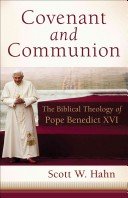 Covenant and Communion: The Biblical Theology of Pope Benedict XVI by Scott W. Hahn (Brazos Press, Grand Rapids, Michigan, 2009)
Covenant and Communion: The Biblical Theology of Pope Benedict XVI by Scott W. Hahn (Brazos Press, Grand Rapids, Michigan, 2009)
I read this book quickly, because it's a book to be read slowly. I should have guessed from the names on the dust jacket quotes—names like David L. Jeffrey, Hans Boersma, and Tremper Longman—that Covenant and Communion would be more like a book from a seminary library than the local Christian bookstore. There's a lot of heavy theology here, and I currently have neither the time nor the inclination to do it justice. However, that didn't stop the text from grabbing me occasionally and slowing me down enough to pull a few quotes. Quotation marks set off Pope Benedict's actual words. (More)
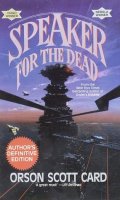 Ender's Game, by Orson Scott Card (Tor, New York, 1991)
Ender's Game, by Orson Scott Card (Tor, New York, 1991)
Speaker for the Dead by Orson Scott Card (Tor, New York, 1991)
The short story version of Ender's Game was written back in 1977—more than 30 years ago—and even the novel is 25 years old. That was right when my reading interests veered sharply from science fiction to children and education, so I missed Orson Scott Card entirely until now. Extended visits for the birthing of grandchildren put me in contact with other people's libraries: it was at the birth of another grandchild that I discovered The Hitchhiker's Guide to the Galaxy and finally learned the significance of 42. (More)
As I've said before, Isaac Asimov has long been one of my favorite authors, from science fiction (of course) to science fact to history to mystery. But his fantasy falls flat, at least if judged by Magic: The Final Fantasy Collection, which I finished reading today.
Asimov is fond of quoting Arthur C. Clarke's assertion that any sufficiently advanced technology is indistinguishable from magic; this may go far to explaining why I find his fantasy unsatisfactory. He is all-rational,* to the extent that even his demons and his dragons seem mundane. There is no magic in his magic. Some of the tales are good stories, but they lack the sparkle, the wonder, the life of a good fantasy.
Interestingly, Asimov had great respect for J.R.R. Tolkien as a writer and read The Lord of the Rings at least five times. Since I consider Tolkien to be a master at the elements that I find lacking in Asimov's fantasy stories, I wonder if those aspects of the LOTR, which in my opinion make it the monumental work that it is, were invisible to him.
Perhaps they were; certainly there is enough depth to the story to attract people on many different levels, as the makers of the movie version proved. Or...perhaps...he did catch a glimpse of the book's magic, which continued to draw him back, though he didn't know why.
 Stained Glass Elegies: Stories by Shusaku Endo translated by Van C. Gessel (Tuttle Publishing, Tokyo, 1986)
Stained Glass Elegies: Stories by Shusaku Endo translated by Van C. Gessel (Tuttle Publishing, Tokyo, 1986)
When Basel records the highest temperature in Switzerland, and much of Europe has the temperatures of Florida in July without benefit of Florida's air conditioning, and a recent birth precludes visiting the local swimming pool, let alone fleeing to somewhere high in the Alps, then sitting in front of a fan and reading beats most other activities. It especially beats sitting with a hot computer on one's lap, so this will be a short review.
Endo is not an author I would have likely come across on my own, but that's the advantage of having someone else's bookshelves at one's disposal. I chose this book of short stories over the many Endo novels available, on the theory that they would work better in a household punctuated by random baby needs.
Although the themes are decidedly adult, and rather depressing, the stories were good to read and rarely objectionable, even to me. What I found most fascinating was the glimpse of life from a Japanese point of view. Recurring motifs, probably somewhat autobiographical, include tuberculosis; hospitals; internal doubts, fears and struggles; war; and the suffering of Christians, both martyrs and apostates, during the time when Japan attempted to stamp out Christianity—and the effect that era has on Japanese Christians today. "Would I be able to endure torture and death—and the torture and death of my family—without abandoning my faith?" is not a thought most American Christians give serious consideration, but apparently for Endo, a Japanese Catholic in a land where Christians of all sorts make up only 2% of the population, it was a haunting question.
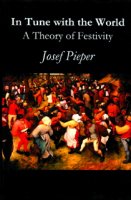 In Tune with the World: A Theory of Festivity by Josef Pieper, translated from the German by Richard and Clara Winston (St. Augustine's Press, South Bend, Indiana, 1999; original copyright 1963, translation copyright 1965)
In Tune with the World: A Theory of Festivity by Josef Pieper, translated from the German by Richard and Clara Winston (St. Augustine's Press, South Bend, Indiana, 1999; original copyright 1963, translation copyright 1965)
Sometimes it helps to take a second look.
I wasn't halfway through the first chapter before I was disappointed with In Tune with the World. It was my own fault: Despite the book's subtitle, I had been expecting practical suggestions for recovering festivity in a society where abundance is commonplace. (See New Year's Resolution #2: Rediscover Feasting.) However, when Pieper says "a theory of festivity," that is exactly what he means. (More)
The day I arrived in Basel on this trip, I felt in need of some "chill-out" reading that wouldn't tax my jet-lagged brain cells. Fortunately, Janet and Stephan's bookshelves are well stocked, even after eliminating the books in German, French, and Japanese.
For much of my life, Isaac Asimov was one of my very favorite authors, first for his science fiction, and later for his non-fiction. (I had the pleasure of astonishing him once at a science fiction convention by presenting to him one of his American history books for autographing.) Asimov kept writing—surely he must hold some record for the quantity and scope of his works—but life took me in different directions and I neglected him for many years, except for re-reading his delightful Black Widowers mystery stories.
But there on the bookshelf was Gold, a collection of some of his last short stories and essays, and it was just what I wanted. (More)
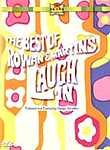
 Rowan & Martin's Laugh-In and The Smothers Brothers Comedy Hour
Rowan & Martin's Laugh-In and The Smothers Brothers Comedy Hour
Thanks to Netflix, we're reprising the 1960's. Just a little. Contrary to popular, romantic belief, the 60's and 70's were a difficult and painful time for our country, and while there was some progress made in important arenas, I see those times as watershed years, in which our society turned rapidly for the worse in many ways. I never did like Forrestt Gump; it cuts too close to the bone. Nonetheless, while searching for some clean comic relief, I chose to look backwards, at some "best of" takes on two shows that made me laugh in my high school days.
My memory was confirmed that of the two the Smothers Brothers show was by far the better. I've removed from our queue the remaining Laugh-In disks in the series, but kept two more of the Smothers Brothers. They make me laugh still. Only now, I cry as well. (More)
Food Rules: An Eater's Manual by Michale Pollan (Penguin, New York, 2009)
Food Rules is a condensation of what journalist Pollan has learned from his investigation of what's wrong with the American diet and how it can be improved. If this is the only Pollan food book you will read, or if you want to introduce his ideas to a skeptical friend with a short attention span, it rates five stars. Half of the 140 pages are merely pictures, and the other half are short and very easy to read.
I enjoyed reading through it, but am glad I borrowed it instead of buying it, as for my purposes The Omnivore's Dilemma and In Defense of Food are better. (On the other hand, at $6.60 from Amazon, the book costs no more than one of those fast food meals Pollan wants us to avoid.)
From #1 Eat food (as opposed to edible food-like substances) to #63 Break the rules once in a while, following these succinct suggestions would go a long way towards improving most people's diets. Best of all I like Pollan's relaxed attitude that reminds us that eating well isn't rocket science, nor is it onerous. It's a basic birthright that we have lost and must reclaim for ourselves and our children.
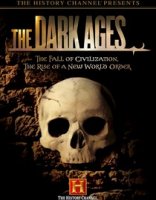 The Dark Ages (The History Channel, 2007, not rated)
The Dark Ages (The History Channel, 2007, not rated)
Having worked for a number of months in New York City, Porter had the opportunity both to explore the History Channel on television and to observe throughout the city the advertising placards proclaiming, "The History Channel: Where History Is Made Every Day." If he were a vandalizing sort of person, New Yorkers would have soon seen a slight alteration in the slogan:

With my expectations sufficiently lowered, I found The Dark Ages not to be too bad. (Thanks, Netflix.) It's not my favorite approach to a historical documentary—Ken Burns set a standard that is hard to beat. The tone is unpleasantly sensationalistic, and the re-enactments almost painfully unprofessional. But the facts are consistent with what little I know of the time period (as consistent as historians get, anyway), and without doubt the show packs an amazing amount of history into 94 minutes.
I believe history needs to be taught using many sources, and many approaches. Not only does this help balance out the inevitable bias each historian brings to his work, but I'm sure I'm not the only person who needs to hear a fact at least three times before it sticks with me. The Dark Ages is not a great show, but it works well in this context.
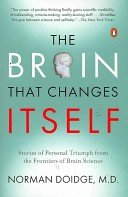 The Brain that Changes Itself: Stories of Personal Triumph from the Frontiers of Brain Science by Norman Doidge (Penguin, New York, 2007)
The Brain that Changes Itself: Stories of Personal Triumph from the Frontiers of Brain Science by Norman Doidge (Penguin, New York, 2007)
Neuroplasticity.
The idea that our brains are fixed, hard-wired machines was (and in many cases still is) so deeply entrenched in the scientific establishment that evidence to the contrary was not only suppressed, but often not even seen because the minds of even respectable scientists could not absorb what they were certain was impossible. Having been familiar since the 1960s with the work of Glenn Doman and the Institutes for the Achievement of Human Potential, the idea that the human brain is continually changing itself and can recover from injury in astonishing ways did not surprise me. In fact, the only shock was that in a 400 page book on neuroplasticity and the persecution of its early pioneers I found not one mention of Doman's name. But the stories are none the less astonishing for that.
In Chapter 1 we meet woman whose vestibular system was destroyed by antibiotic side-effects. She is freed by a sensor held on her tongue and a computerized helmet from the severely disabling feeling that she is falling all the time, even when lying flat. That's the stuff of science fiction, but what's most astounding is that the effect lingers for a few minutes after she removes the apparatus the first time, and after several sessions she no longer needs the device. (More)
Permalink | Read 8191 times | Comments (6)
Category Reviews: [first] [previous] [next] [newest] Education: [first] [previous] [next] [newest] Health: [first] [previous] [next] [newest] Children & Family Issues: [first] [previous] [next] [newest]
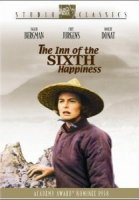 The Inn of the Sixth Happiness (20th Century Fox, 1958, not rated)
The Inn of the Sixth Happiness (20th Century Fox, 1958, not rated)
A sympathetic and positive portrayal of a segment of the life of Gladys Aylward, the British Christian servant girl with a powerful love of both God and China. This small woman (incongrously but convincingly played by Ingrid Bergman) had great impact in northern China during the tumultous 1930's and 40's. Single-handedly leading nearly 100 children over the mountains to safety during the Japanese invasion, and persuading the remote villages to comply with the new law against the footbinding of women, were but a small part of her successes.
As movies go, this one is reasonably true to the story. I realize that's damning with faint praise, but I've learned to lower my expectations for truth from movies, which must alter events to make a convincing story fit in under three hours, and must include non-existent romantic scenes to please the audience. Perhaps its worst crime is in making Aylward's extremely arduous life look easy. In addition to the "normal" hardships of malnutrition and hard labor, she was beaten, tortured, shot, and severely injured in a bomb blast, but Bergman's hair is never mussed more than can be fixed with a quick flick of her fingers, and the journey across the mountains seems almost as easy as the end of The Sound of Music.
It's a fun and inspiring movie, worth watching if you also make a point of learning "the rest of the story." As much as can be learned, anyway: Aylward was old, with broken health and failing memory, when her story was finally written down, so much remains unknown.
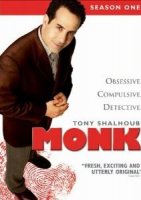
Monk, the television show about obsessive-compulsive detective Adrian Monk, ran from 2002 - 2009. We encountered it in 2007, thanks to Netflix and the suggestion of a friend, and completed the eighth and last season this month. Part mystery, part comedy, and part fantasy, Monk ranks as the only television show for which we have seen every episode. (More)
Rimsky-Korsakov: Russian Easter Overture, op. 36
Respighi: Church Windows
Debussy: Sunken Cathedral
Sung: The Circle Closes
This, the last of our subscription concerts for the season, promised to be a great one. I love the Russian Easter Overture, and the Orlando Phil did a nice job with its glorious, solemn, joyful, and triumphant Resurrection Day music. The next two works were new to me, but I like Respighi a lot, and Debussy well enough, and they did not disappoint. This concert was a bit different, having extra lights that projecting a lotus blossom-like image of changing colors behind the orchestra during this, the first half of the performance. It was hardly necessary, but was simple enough not to detract from the music, and may even have enhanced it a little.
The second half of the show was another story. This is where I was truly disappointed, because for it my expectations had been highest. I'd loved every Stella Sung composition I'd heard, beginning with the suite she wrote for the Florida Symphony Youth Orchestra back in the 1990's. As I said before, I've never yet met a Stella Sung work I didn't like. (More)
 Ever since our visit to Rio de Janiero, where we began each morning with suco de maracujá sem açúcar, out-of-this-world unsweetened passion fruit juice, I have been on the alert for passionfruit flavors. Alas, nearly every version of passionfruit juice sold here is sweetened, which does a serious disservice to the noble fruit.
Ever since our visit to Rio de Janiero, where we began each morning with suco de maracujá sem açúcar, out-of-this-world unsweetened passion fruit juice, I have been on the alert for passionfruit flavors. Alas, nearly every version of passionfruit juice sold here is sweetened, which does a serious disservice to the noble fruit.
However, if you're going to adulterate the passionfruit, the Feodora Grand'Or Maracuja 75% Cacao chocolate bar is a good way to go. Porter found this German delight for me in New York City. At 75% cacao, the chocolate loses a little too much of its "mouthfeel" to be perfect, but the maracuja flavor is heavenly. Don't pass this up if you get the opportunity to taste some.
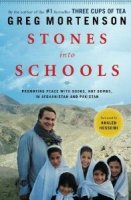 Stones into Schools: Promoting Peace with Books, not Bombs, in Afghanistan and Pakistan, by Greg Mortenson
(Viking Penguin, New York, 2009)
Stones into Schools: Promoting Peace with Books, not Bombs, in Afghanistan and Pakistan, by Greg Mortenson
(Viking Penguin, New York, 2009)
I knew before finishing Three Cups of Tea that I wanted to read the sequel. Stones into Schools is even more wonderful. For one thing, Mortenson has found better help with the writing, so the story is crafted in a riveting, compelling fashion. (More)


